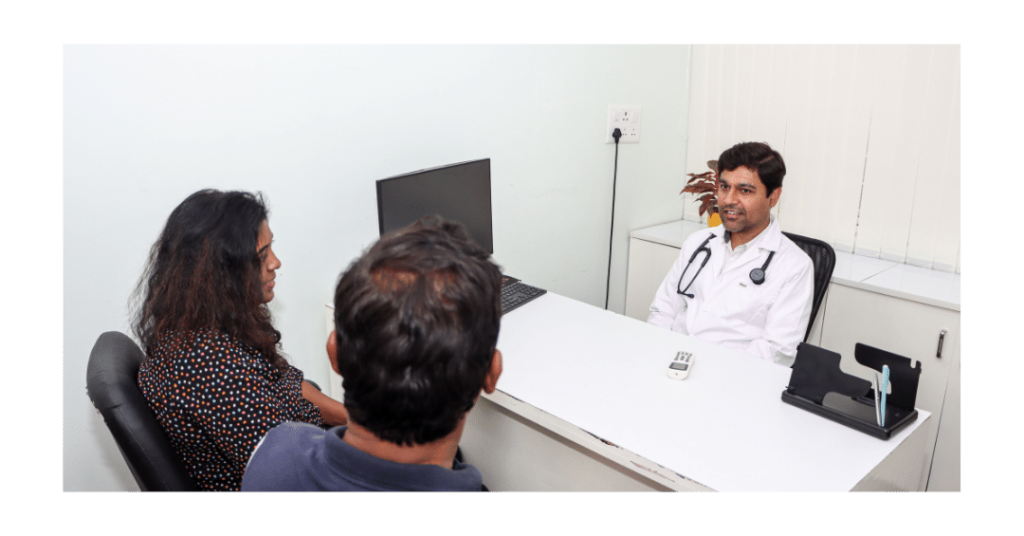What is Blood Pressure?
Blood pressure refers to the force exerted by the blood against the walls of the arteries as the heart pumps it throughout the body. Measured in millimetres of mercury (mmHg), blood pressure consists of two values: systolic pressure and diastolic pressure. The systolic pressure represents the force when the heart contracts and pumps blood into the arteries, while the diastolic pressure reflects the pressure in the arteries when the heart is resting between beats. Blood pressure is a critical indicator of cardiovascular health, and maintaining it within a healthy range is essential to prevent various heart-related complications. Regular monitoring and adopting a balanced lifestyle can help manage blood pressure and promote overall well-being.
Maintaining healthy blood pressure is a crucial aspect of overall well-being. Fluctuations in blood pressure levels can lead to serious health issues, including heart disease and stroke. At Wisden Clinics, we understand the importance of a balanced lifestyle in managing blood pressure. In this article, we present the top 8 best ways to normalize blood pressure, backed by our expert medical advice.

1. Adopt a Balanced Diet
A heart-healthy diet is a cornerstone of blood pressure management. Consume a diet rich in whole grains, lean proteins, fruits, vegetables, and low-fat dairy products. Minimize your sodium intake to help control blood pressure. Opt for foods high in potassium, as it counteracts the effects of sodium and supports healthy blood pressure levels.
2. Engage in Regular Physical Activity
Exercise is a powerful tool for blood pressure management. Aim for at least 150 minutes of moderate-intensity aerobic activity per week, such as brisk walking, swimming, or cycling. Regular exercise helps improve cardiovascular health, reduces stress, and contributes to maintaining optimal blood pressure levels.
3. Manage Stress
Chronic stress can lead to elevated blood pressure. Incorporate stress-reduction techniques into your routine, such as deep breathing, meditation, yoga, and mindfulness. Finding healthy ways to cope with stress can have a positive impact on your blood pressure.
4. Limit Alcohol Consumption
Excessive alcohol intake can contribute to high blood pressure. If you choose to drink, do so in moderation. For men, this means up to two drinks per day, and for women, one drink per day. Be mindful of the impact of alcohol on your overall health.
5. Maintain a Healthy Weight
Being overweight increases the strain on your heart and blood vessels, leading to higher blood pressure. Aim to achieve and maintain a healthy weight through a combination of a balanced diet and regular physical activity. Consulting a healthcare professional can help you set realistic weight loss goals.
6. Quit Smoking
Tobacco use is a major risk factor for high blood pressure and heart disease. If you smoke, quitting is one of the most impactful steps you can take to improve your health. Seek support from healthcare professionals or smoking cessation programs to help you succeed.
7. Monitor Your Blood Pressure
Regular monitoring allows you to track your progress and make necessary adjustments to your lifestyle. Invest in a reliable home blood pressure monitor and record your readings. Share this information with your healthcare provider to ensure your efforts are yielding positive results.
8. Get Adequate Sleep
Sleep plays a crucial role in regulating blood pressure. Strive for 7-9 hours of quality sleep each night. Establish a consistent sleep schedule, create a relaxing bedtime routine, and create a sleep-conducive environment to promote better sleep.

Conclusion
At Wisden Clinics, we prioritize your well-being and are dedicated to providing comprehensive guidance on maintaining a healthy lifestyle. By adopting these top 8 best ways to normalize blood pressure, you can take charge of your cardiovascular health and reduce the risk of associated complications. Remember, small changes can yield significant results, and a commitment to a healthier lifestyle can lead to a brighter, healthier future.

